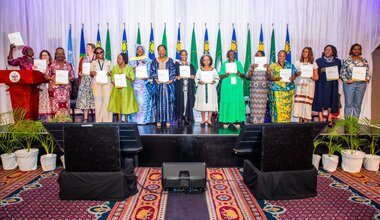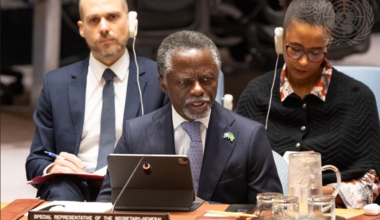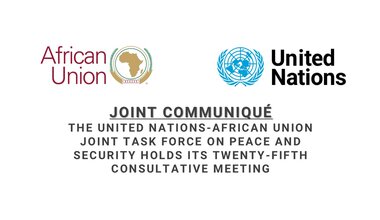UNOAU STATEMENT TO THE AUPSC 1242nd MEETING ON WOMEN PEACE AND SECURITY
Excellency Ambassador Dr. Mohamed Gad, Permanent Representative of the Arab Republic of Egypt to the African Union (AU) and Chairperson of the Peace and Security Council (PSC) for October 2024;
Excellencies, Members of the AU PSC;
Excellency Bankole Adeoye, AU Commissioner for Political Affairs, Peace and Security;
Excellency Mme. Bineta Diop;
Special Envoy of the Chairperson of the AU Commission on Women, Peace, and Security;
Invited Guests;
Distinguished representatives of women, CSOs;
Ladies and Gentlemen.
At the outset, I wish to commend Egypt for its exemplary leadership of the African Union Peace and Security Council (AUPSC) during the month of October, particularly in steering several strategic meetings, including the annual engagements with the United Nations Security Council (UNSC) and the Peacebuilding Commission.
The United Nations further wishes to express its appreciation to the AUPSC for institutionalizing the issue of Women, Peace and Security (WPS) as part of its annual standing agenda, in line with the decision of its 223rd session held in 2010. These sessions serve not only to follow-up on the progress and challenges in implementing Security Council resolution 1325 across Africa, but also to provide a platform for reflecting on issues affecting women in contexts of conflict and development.
Chairperson,
The current trends on the continent are concerning.
The existing data paints a stark picture of armed conflict and violence, which is eroding the progress made over decades, thereby diminishing the dividends we worked so hard to achieve. Generational gains in women’s rights hang in the balance, undermining the transformative potential of women’s leadership in the pursuit of peace and development.
AU member states have repeatedly committed to ensuring women’s participation in conflict prevention, resolution and recovery, and to upholding their rights, including during times of war. Yet, in the Sudan -just to cite a recent example- women remained excluded from the diplomatic initiatives launched in response to the outbreak of the conflict, including those convened at the regional and international levels in 2023, such as in Jeddah, Saudi Arabia.
According to the UN Secretary-General’s report on Women, Peace and Security published in 2024, the number of women killed in armed conflicts doubled last year compared to 2022, accounting for 40 per cent of all deaths in war, while UN-verified cases of conflict-related sexual violence increased by 50 per cent.
The United Nations continues to undertake initiatives aimed at supporting the participation of Women in peacebuilding efforts. For its part, amongst others, the UNOAU supported High-Level missions to the Democratic Republic of the Congo (DRC) to promote the equal participation of women in elections, provide training to Election Management Bodies on gender-responsive elections, and strengthen the capacity of civil society organisations to play meaningful roles in the election processes and mobilize communities for peaceful elections.
Chairperson,
The United Nations is also dedicated to addressing conflict-related sexual violence. Allow me to recall that, on 31 January 2014, the AU and the UN signed a framework for cooperation on the Prevention and Response to Conflict-related Sexual Violence in Africa. This framework established collaboration between the Office of the Special Representative of the Secretary-General on Sexual Violence in Conflict and the African Union Commission across several priority areas: combating impunity, promoting accountability as a deterrent, fostering political leadership, and enhancing information-sharing on sexual violence as a foundation for action.
As Special Representative Pramila Patten highlighted in her 2019 address to the AUPSC, “the essential, existential task we face is to silence the guns and amplify the voices of women as a critical constituency for peace. Right now, in the Sudan, women and girls are being brutalized and terrorized by sexual violence committed at gunpoint. The systematic assault on, and erasure of, women and their rights is destroying lives and livelihoods”.
The United Nations wishes to call upon member states to adopt, where they have not yet done so, and to implement, where they already exist, joint strategies and commitments to eradicate conflict-related sexual violence. We must also recommit to the outcomes adopted by this Council at its 1109th meeting, held on 3 October 2022, on the Commemoration of the Resolution 1325 on Women, Peace and Security. Chairperson,
Achieving lasting peace requires amplifying women’s voices and ensuring their inclusion in peace processes across the conflict cycle. Women’s participation not only enhances the legitimacy of peace processes, but it also contributes to more sustainable outcomes. Research shows that peace agreements are more likely to endure when women are involved in their negotiation and implementation.
Women should have a voice in critical decisions on conflict resolution, humanitarian coordination, community security, access to justice, early warning and climate mitigation and adaptation. Policies must be informed by the priorities of women civil society and political actors, including peacebuilders, mediators, and youth organizations active at the local level.
This imperative was emphasized even recently, at the 15th High-level AU Retreat on the promotion of peace, security and stability, held in Abidjan on 25-26 October, and even days earlier, by this Council at its 7th Annual Consultative Meeting with the UN Peacebuilding Commission on 15 October; and at its Annual Consultative Meetings with the members of the UN Security Council on 17-18 October, in New York.
There is recognition that the number of women mediator networks is growing, including at national and local levels. Nearly every region and subregion on the continent has created women mediator networks in recent years, and many countries have established local ones. In Kenya, the representation of women in county peace committees increased to 34 per cent last year, compared with 14 per cent a decade ago.
Chairperson,
The role of women in peace support operations cannot be overstated. Women bring unique perspectives, experiences, and skills that are essential for effective conflict resolution and peacebuilding. In our peace operations across Africa, we have evidence that women peacekeepers and negotiators build bridges where divisions previously prevailed. Their contributions are not supplementary; they are fundamental to the success of our missions. Yet, despite these compelling reasons, women remain under-represented in peace support operations. This lack of inclusion is not only a loss for women but a collective loss, as it limits our full potential for more successful outcomes. When we fail to include half of our population in these critical processes, we deny ourselves the full potential of our collective wisdom and creativity. The United Nations remains committed to promoting the role of women in peace support operations.
The UNOAU, within the context of the United Nations –African Union Joint Framework for Enhanced Partnership in Peace and Security, organized training and capacity-building initiatives with the AU Office of the Special Envoy on Women, Peace and Security, as well as with the AU Peace and Security Department – Gender Programme, aimed at building capacity of peace support operations in conflict analysis and protection of women and girls. These are just a few of the many initiatives we are undertaking jointly as part of the implementation of Security Council resolution 1325.
Chairperson, esteemed Members of the Security Council,
The United Nations wishes to call upon Member States to accelerate initiatives and processes for enhancing women’s participation in decision-making. The increased participation of women can profoundly influence lawmaking and policy development to benefit society as a whole. For instance, in Sierra Leone, the growth in women’s parliamentary representation in 2023 played a significant role in the legislative advancement that led to the prohibition of child marriage in 2024.
The United Nations also calls upon member states to hold violators of women’s rights accountable. There is a need to ensure that mechanisms and criminal justice systems designed to pursue those who commit crimes against women in all spheres of life are adequately resourced and supported to deliver on their mandate. Such crimes include conflict-related sexual violence, reproductive violence or violence against women in political and public life, both online and offline. The United Nations is committed to continue supporting initiatives aimed at enhancing the implementation of the UN-AU Framework of Cooperation on Prevention Against conflict-related sexual violence.
Chairperson,
Women human rights defenders often face significant risks, including gender-based persecution when seeking asylum. Therefore, adopting and enforcing stronger protection measures is imperative. The UN also urges member states to prioritize full access to sexual and reproductive healthcare for survivors of conflict-related sexual violence, including emergency care for pregnancies resulting from rape, given the widespread and systematic use of sexual violence.
The United Nations stands ready to work closely with the AU and its member states on these critical issues to advance the objectives of UNSCR 1325 and to foster peace across the African continent.
Thank you.
 UN
UN





